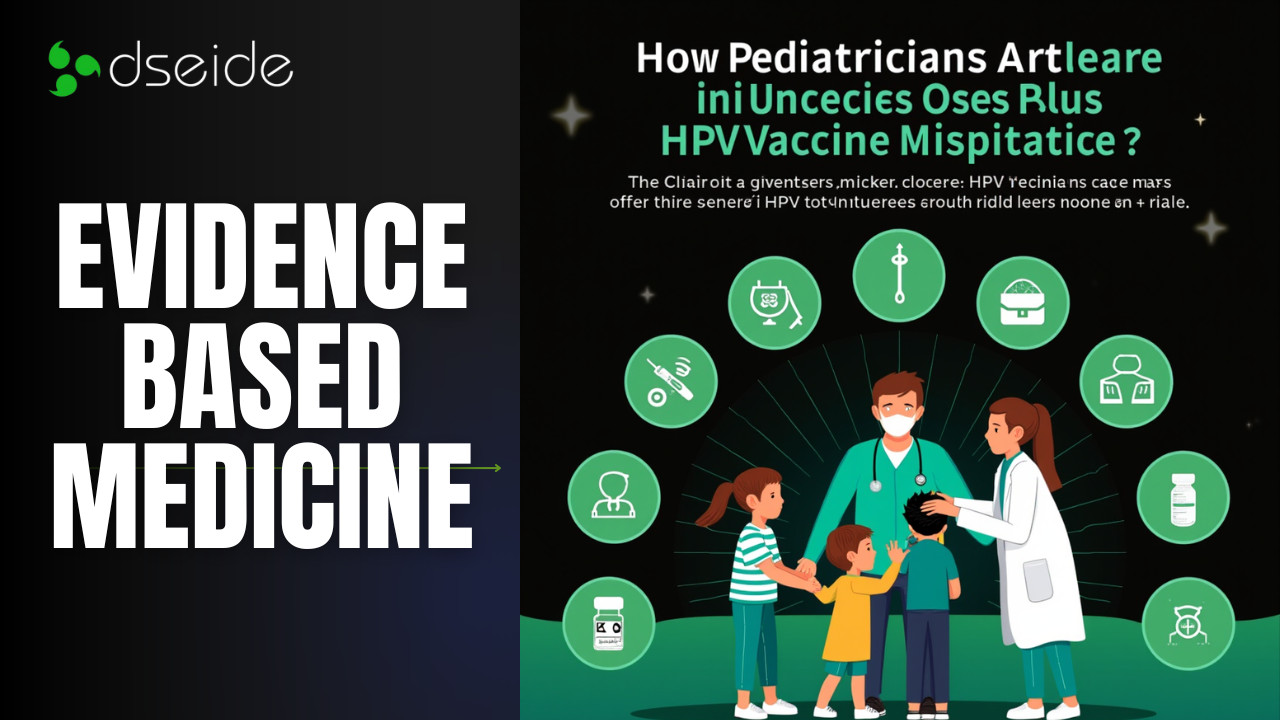How Pediatricians Are Essential in Clearing Up HPV Vaccine Misconceptions
The human papillomavirus (HPV) vaccine is a powerful tool in the fight against several types of cancer, including cervical cancer and other HPV-related diseases. Despite its proven benefits, the vaccine is often surrounded by myths and misinformation that can deter parents from vaccinating their children. Pediatricians, as primary health care providers, are crucial in combating these misconceptions and providing accurate information. Here’s how pediatricians are making a significant impact in clarifying the facts about the HPV vaccine.
The Importance of the HPV Vaccine
The HPV vaccine offers protection against the human papillomavirus, a common sexually transmitted infection associated with various cancers. It is recommended for preteens and teenagers to ensure they are protected before becoming sexually active. Despite the vaccine's endorsement by major health organizations and its effectiveness in preventing HPV-related cancers, several myths persist. Pediatricians play a key role in addressing these myths and promoting the vaccine's benefits.
Addressing Common HPV Vaccine Myths
Myth: The HPV Vaccine Encourages Risky Behavior
A common misconception is that the HPV vaccine might encourage teenagers to engage in risky sexual behavior. However, research shows no increase in sexual activity among vaccinated individuals. Pediatricians clarify that the vaccine is a preventive health measure, akin to other vaccines, and does not influence sexual behavior.
Myth: The HPV Vaccine Is Unsafe
Safety concerns are often raised about vaccines. Pediatricians counter these worries by highlighting the extensive research and rigorous approval processes that ensure the HPV vaccine's safety. Most side effects are minor, such as temporary soreness or a mild fever, and the benefits far outweigh the risks.
Myth: The HPV Vaccine Is Only for Girls
Some believe that only girls need the HPV vaccine, but this is not true. HPV can affect anyone, regardless of gender. Pediatricians emphasize that the vaccine is recommended for both boys and girls to protect against HPV-related cancers affecting both sexes.
Myth: The HPV Vaccine Is Ineffective
Doubts about the vaccine’s effectiveness often arise because it doesn’t cover all types of HPV or all related cancers. Pediatricians explain that while the vaccine does not protect against every HPV strain, it covers the most common high-risk types and significantly reduces the incidence of HPV-related cancers.
Myth: The HPV Vaccine Is Too New to Be Trusted
Some question the HPV vaccine’s long-term safety due to its relatively recent introduction. Pediatricians address these concerns by pointing out the extensive data supporting the vaccine’s safety and effectiveness, accumulated over more than a decade of use.
The Role of Pediatricians in Education and Advocacy
Pediatricians are well-positioned to educate families about the HPV vaccine due to their trusted relationships with patients and their families. They play a crucial role by:
Providing Evidence-Based Information: Sharing accurate and up-to-date information about the vaccine’s safety, effectiveness, and benefits.
Engaging in Meaningful Conversations: Addressing parents' concerns and questions with empathy and clarity.
Encouraging Timely Vaccination: Recommending the vaccine schedule to ensure children receive the full series of doses at the appropriate ages.
Partnering with Communities: Working with schools and community organizations to raise awareness and promote vaccination.
Conclusion
Pediatricians are essential in dispelling myths about the HPV vaccine and ensuring that accurate information reaches parents and guardians. By addressing misconceptions with clear, evidence-based information and fostering open dialogue, pediatricians help maximize the benefits of the HPV vaccine. Their efforts not only protect individual health but also contribute to the broader goal of reducing HPV-related cancers and promoting public health.
#Pediatrics
The human papillomavirus (HPV) vaccine is a powerful tool in the fight against several types of cancer, including cervical cancer and other HPV-related diseases. Despite its proven benefits, the vaccine is often surrounded by myths and misinformation that can deter parents from vaccinating their children. Pediatricians, as primary health care providers, are crucial in combating these misconceptions and providing accurate information. Here’s how pediatricians are making a significant impact in clarifying the facts about the HPV vaccine.
The Importance of the HPV Vaccine
The HPV vaccine offers protection against the human papillomavirus, a common sexually transmitted infection associated with various cancers. It is recommended for preteens and teenagers to ensure they are protected before becoming sexually active. Despite the vaccine's endorsement by major health organizations and its effectiveness in preventing HPV-related cancers, several myths persist. Pediatricians play a key role in addressing these myths and promoting the vaccine's benefits.
Addressing Common HPV Vaccine Myths
Myth: The HPV Vaccine Encourages Risky Behavior
A common misconception is that the HPV vaccine might encourage teenagers to engage in risky sexual behavior. However, research shows no increase in sexual activity among vaccinated individuals. Pediatricians clarify that the vaccine is a preventive health measure, akin to other vaccines, and does not influence sexual behavior.
Myth: The HPV Vaccine Is Unsafe
Safety concerns are often raised about vaccines. Pediatricians counter these worries by highlighting the extensive research and rigorous approval processes that ensure the HPV vaccine's safety. Most side effects are minor, such as temporary soreness or a mild fever, and the benefits far outweigh the risks.
Myth: The HPV Vaccine Is Only for Girls
Some believe that only girls need the HPV vaccine, but this is not true. HPV can affect anyone, regardless of gender. Pediatricians emphasize that the vaccine is recommended for both boys and girls to protect against HPV-related cancers affecting both sexes.
Myth: The HPV Vaccine Is Ineffective
Doubts about the vaccine’s effectiveness often arise because it doesn’t cover all types of HPV or all related cancers. Pediatricians explain that while the vaccine does not protect against every HPV strain, it covers the most common high-risk types and significantly reduces the incidence of HPV-related cancers.
Myth: The HPV Vaccine Is Too New to Be Trusted
Some question the HPV vaccine’s long-term safety due to its relatively recent introduction. Pediatricians address these concerns by pointing out the extensive data supporting the vaccine’s safety and effectiveness, accumulated over more than a decade of use.
The Role of Pediatricians in Education and Advocacy
Pediatricians are well-positioned to educate families about the HPV vaccine due to their trusted relationships with patients and their families. They play a crucial role by:
Providing Evidence-Based Information: Sharing accurate and up-to-date information about the vaccine’s safety, effectiveness, and benefits.
Engaging in Meaningful Conversations: Addressing parents' concerns and questions with empathy and clarity.
Encouraging Timely Vaccination: Recommending the vaccine schedule to ensure children receive the full series of doses at the appropriate ages.
Partnering with Communities: Working with schools and community organizations to raise awareness and promote vaccination.
Conclusion
Pediatricians are essential in dispelling myths about the HPV vaccine and ensuring that accurate information reaches parents and guardians. By addressing misconceptions with clear, evidence-based information and fostering open dialogue, pediatricians help maximize the benefits of the HPV vaccine. Their efforts not only protect individual health but also contribute to the broader goal of reducing HPV-related cancers and promoting public health.
#Pediatrics
How Pediatricians Are Essential in Clearing Up HPV Vaccine Misconceptions
The human papillomavirus (HPV) vaccine is a powerful tool in the fight against several types of cancer, including cervical cancer and other HPV-related diseases. Despite its proven benefits, the vaccine is often surrounded by myths and misinformation that can deter parents from vaccinating their children. Pediatricians, as primary health care providers, are crucial in combating these misconceptions and providing accurate information. Here’s how pediatricians are making a significant impact in clarifying the facts about the HPV vaccine.
The Importance of the HPV Vaccine
The HPV vaccine offers protection against the human papillomavirus, a common sexually transmitted infection associated with various cancers. It is recommended for preteens and teenagers to ensure they are protected before becoming sexually active. Despite the vaccine's endorsement by major health organizations and its effectiveness in preventing HPV-related cancers, several myths persist. Pediatricians play a key role in addressing these myths and promoting the vaccine's benefits.
Addressing Common HPV Vaccine Myths
Myth: The HPV Vaccine Encourages Risky Behavior
A common misconception is that the HPV vaccine might encourage teenagers to engage in risky sexual behavior. However, research shows no increase in sexual activity among vaccinated individuals. Pediatricians clarify that the vaccine is a preventive health measure, akin to other vaccines, and does not influence sexual behavior.
Myth: The HPV Vaccine Is Unsafe
Safety concerns are often raised about vaccines. Pediatricians counter these worries by highlighting the extensive research and rigorous approval processes that ensure the HPV vaccine's safety. Most side effects are minor, such as temporary soreness or a mild fever, and the benefits far outweigh the risks.
Myth: The HPV Vaccine Is Only for Girls
Some believe that only girls need the HPV vaccine, but this is not true. HPV can affect anyone, regardless of gender. Pediatricians emphasize that the vaccine is recommended for both boys and girls to protect against HPV-related cancers affecting both sexes.
Myth: The HPV Vaccine Is Ineffective
Doubts about the vaccine’s effectiveness often arise because it doesn’t cover all types of HPV or all related cancers. Pediatricians explain that while the vaccine does not protect against every HPV strain, it covers the most common high-risk types and significantly reduces the incidence of HPV-related cancers.
Myth: The HPV Vaccine Is Too New to Be Trusted
Some question the HPV vaccine’s long-term safety due to its relatively recent introduction. Pediatricians address these concerns by pointing out the extensive data supporting the vaccine’s safety and effectiveness, accumulated over more than a decade of use.
The Role of Pediatricians in Education and Advocacy
Pediatricians are well-positioned to educate families about the HPV vaccine due to their trusted relationships with patients and their families. They play a crucial role by:
Providing Evidence-Based Information: Sharing accurate and up-to-date information about the vaccine’s safety, effectiveness, and benefits.
Engaging in Meaningful Conversations: Addressing parents' concerns and questions with empathy and clarity.
Encouraging Timely Vaccination: Recommending the vaccine schedule to ensure children receive the full series of doses at the appropriate ages.
Partnering with Communities: Working with schools and community organizations to raise awareness and promote vaccination.
Conclusion
Pediatricians are essential in dispelling myths about the HPV vaccine and ensuring that accurate information reaches parents and guardians. By addressing misconceptions with clear, evidence-based information and fostering open dialogue, pediatricians help maximize the benefits of the HPV vaccine. Their efforts not only protect individual health but also contribute to the broader goal of reducing HPV-related cancers and promoting public health.
#Pediatrics





